
六、名词(Noun) 1 Classification of nouns: Nouns can be classified according to word formation,lexical meaning and grammatical form
1 六、名词(Noun) 1、Classification of nouns: ❖ Nouns can be classified according to word formation、lexical meaning and grammatical form
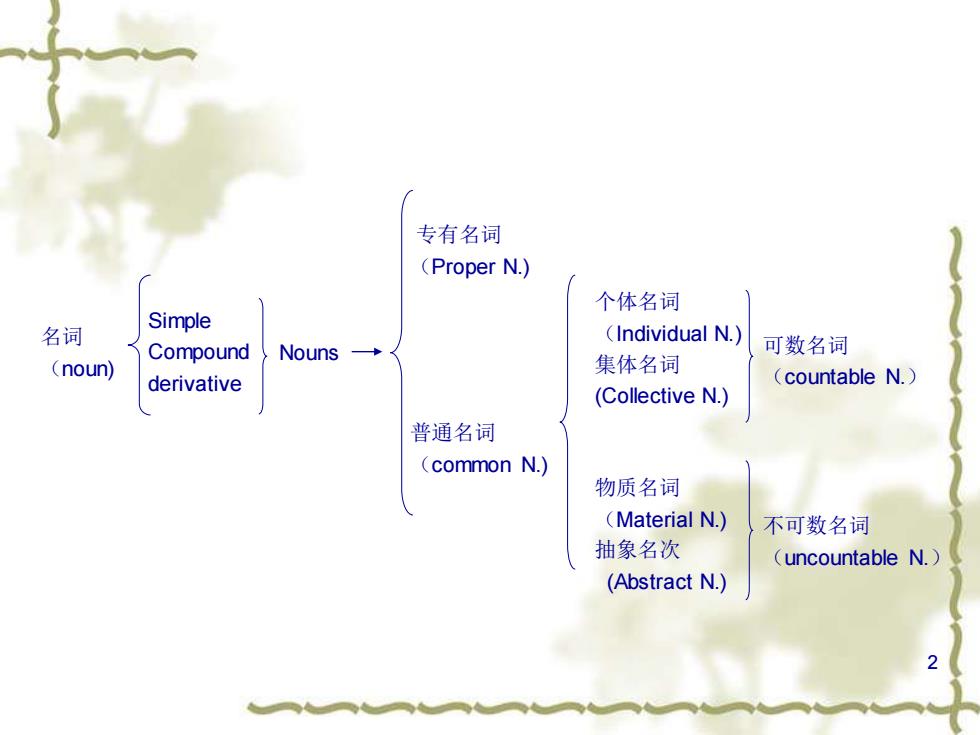
专有名词 (Proper N.) 个体名词 名词 Simple (Individual N.) Compound Nouns 可数名词 (noun) 集体名词 derivative (countable N.) (Collective N.) 普通名词 (common N.) 物质名词 (Material N.) 不可数名词 抽象名次 (uncountable N.) (Abstract N.)
2 名词 (noun) Simple Compound derivative Nouns 专有名词 (Proper N.) 普通名词 (common N.) 个体名词 (Individual N.) 集体名词 (Collective N.) 可数名词 (countable N.) 物质名词 (Material N.) 抽象名次 (Abstract N.) 不可数名词 (uncountable N.)
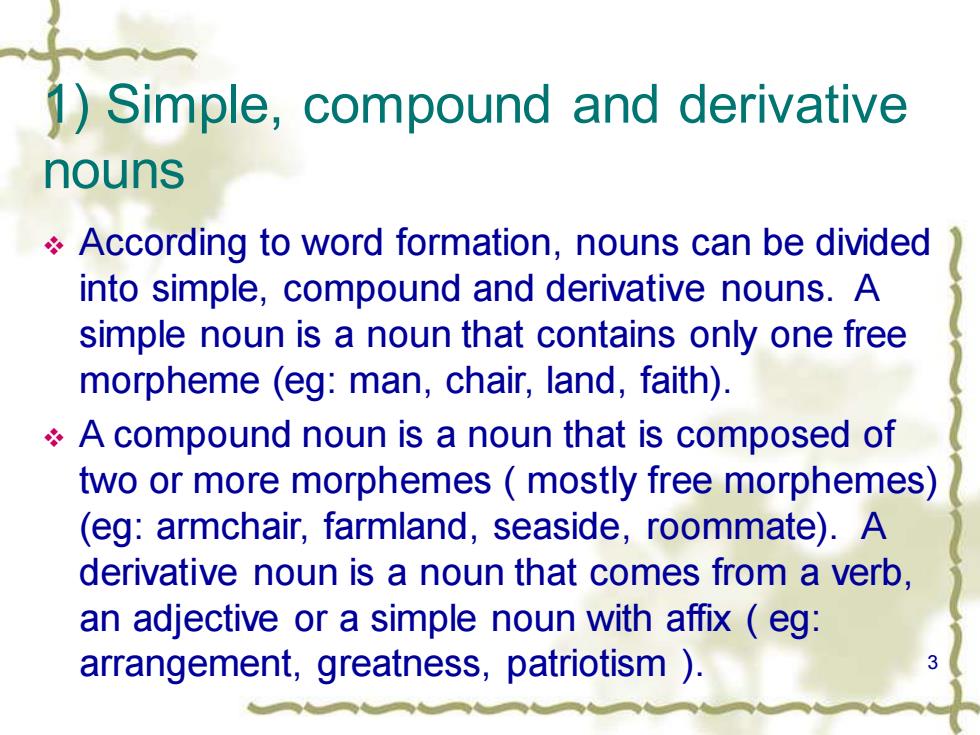
1)Simple,compound and derivative nouns According to word formation,nouns can be divided into simple,compound and derivative nouns.A simple noun is a noun that contains only one free morpheme (eg:man,chair,land,faith). A compound noun is a noun that is composed of two or more morphemes mostly free morphemes) (eg:armchair,farmland,seaside,roommate).A derivative noun is a noun that comes from a verb. an adjective or a simple noun with affix eg: arrangement,greatness,patriotism )
3 1) Simple, compound and derivative nouns ❖ According to word formation, nouns can be divided into simple, compound and derivative nouns. A simple noun is a noun that contains only one free morpheme (eg: man, chair, land, faith). ❖ A compound noun is a noun that is composed of two or more morphemes ( mostly free morphemes) (eg: armchair, farmland, seaside, roommate). A derivative noun is a noun that comes from a verb, an adjective or a simple noun with affix ( eg: arrangement, greatness, patriotism )
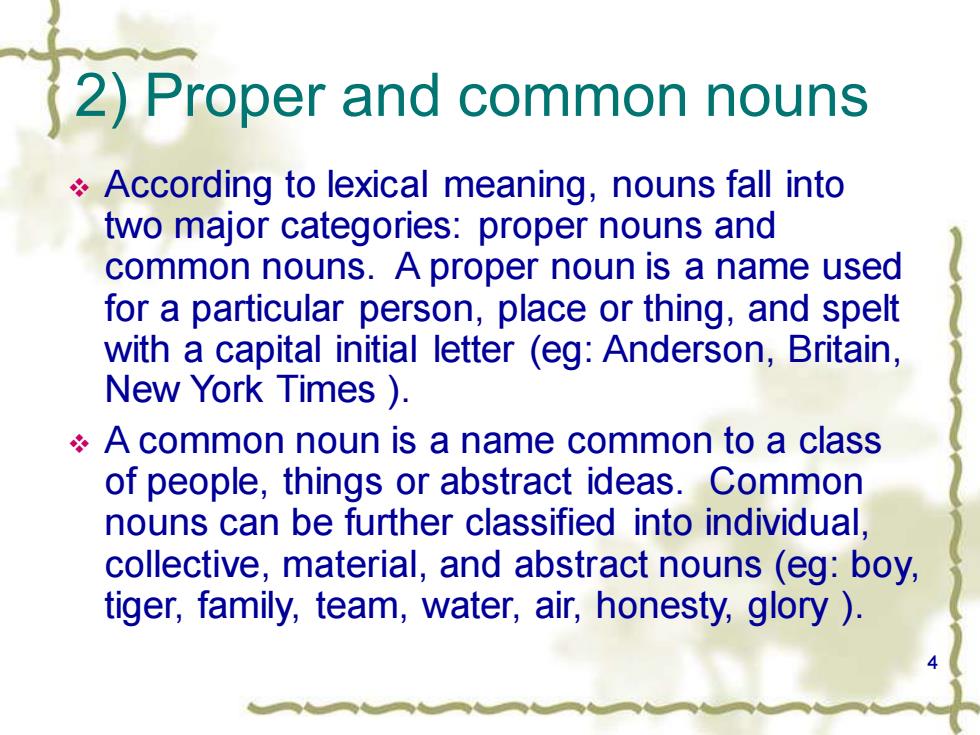
2)Proper and common nouns According to lexical meaning,nouns fall into two major categories:proper nouns and common nouns.A proper noun is a name used for a particular person,place or thing,and spelt with a capital initial letter (eg:Anderson,Britain, New York Times ) A common noun is a name common to a class of people,things or abstract ideas.Common nouns can be further classified into individual, collective,material,and abstract nouns (eg:boy, tiger,family,team,water,air,honesty,glory )
4 2) Proper and common nouns ❖ According to lexical meaning, nouns fall into two major categories: proper nouns and common nouns. A proper noun is a name used for a particular person, place or thing, and spelt with a capital initial letter (eg: Anderson, Britain, New York Times ). ❖ A common noun is a name common to a class of people, things or abstract ideas. Common nouns can be further classified into individual, collective, material, and abstract nouns (eg: boy, tiger, family, team, water, air, honesty, glory )
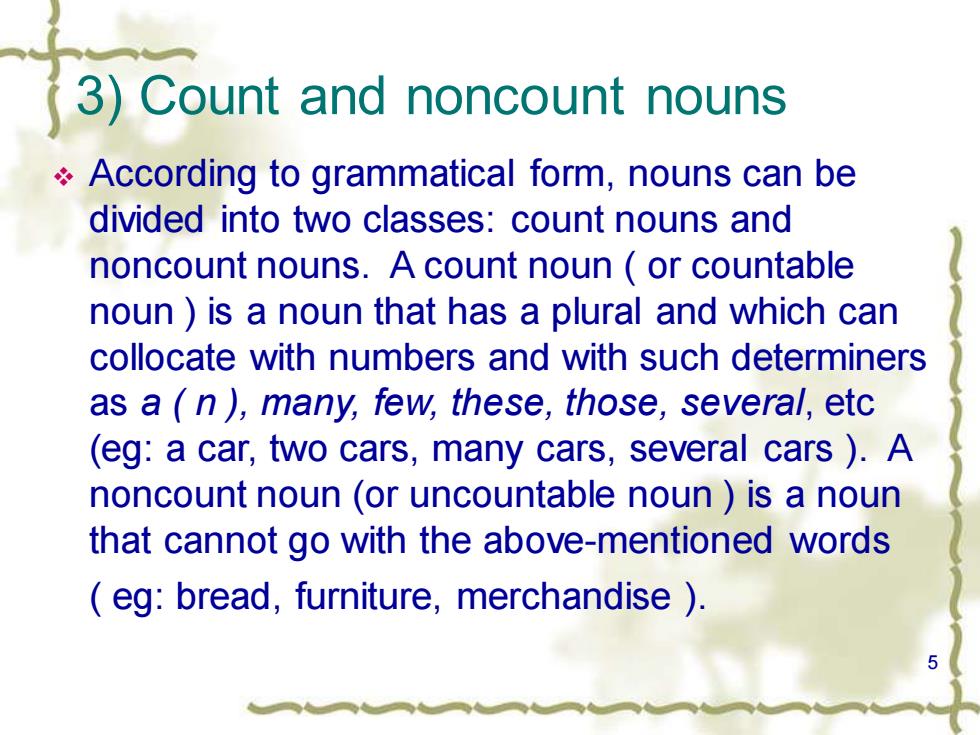
3)Count and noncount nouns According to grammatical form,nouns can be divided into two classes:count nouns and noncount nouns.A count noun or countable noun is a noun that has a plural and which can collocate with numbers and with such determiners as a(n )many,few,these,those,several,etc (eg:a car,two cars,many cars,several cars )A noncount noun (or uncountable noun )is a noun that cannot go with the above-mentioned words eg:bread,furniture,merchandise ) 5
5 3) Count and noncount nouns ❖ According to grammatical form, nouns can be divided into two classes: count nouns and noncount nouns. A count noun ( or countable noun ) is a noun that has a plural and which can collocate with numbers and with such determiners as a ( n ), many, few, these, those, several, etc (eg: a car, two cars, many cars, several cars ). A noncount noun (or uncountable noun ) is a noun that cannot go with the above-mentioned words ( eg: bread, furniture, merchandise )
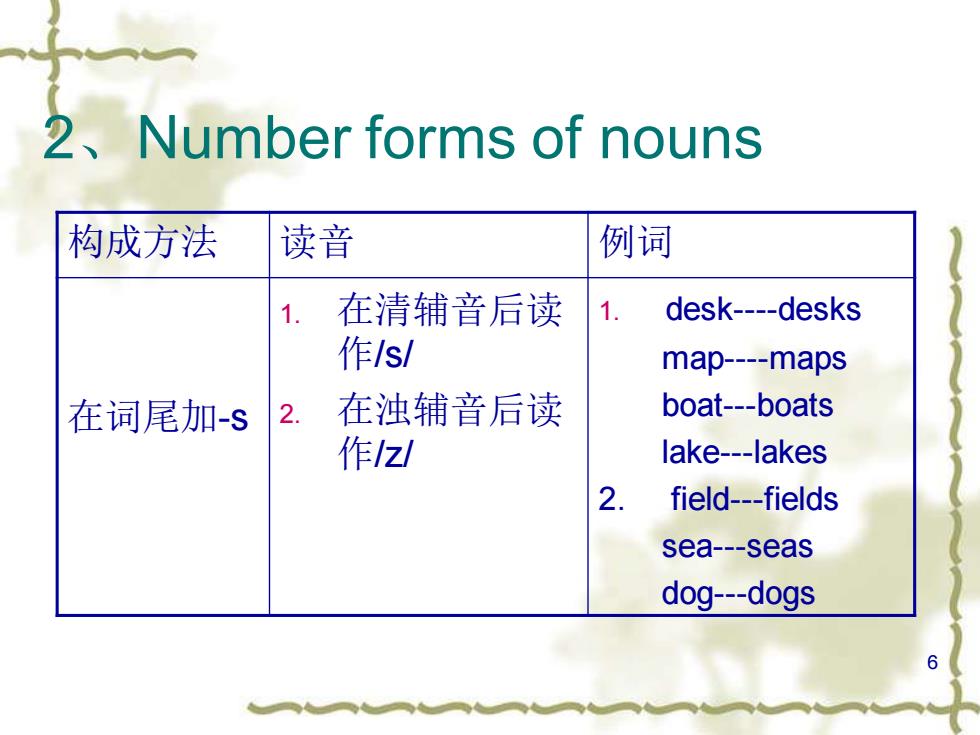
2 Number forms of nouns 构成方法 读音 例词 1. 在清辅音后读 1. desk----desks 作/s1 map----maps 在词尾加-s 2. 在浊辅音后读 boat---boats 作/z lake---lakes 2. field---fields sea---seas dog---dogs 6
6 2、Number forms of nouns 构成方法 读音 例词 在词尾加-s 1. 在清辅音后读 作/s/ 2. 在浊辅音后读 作/z/ 1. desk----desks map----maps boat---boats lake---lakes 2. field---fields sea---seas dog---dogs
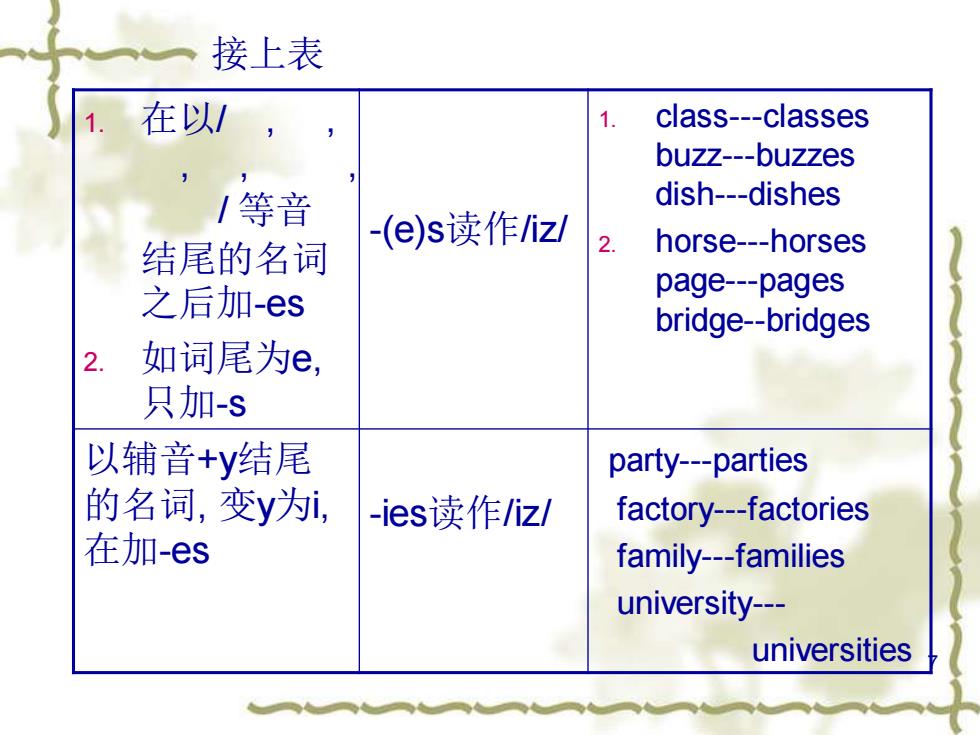
接上表 在以, 1. class---classes buzz---buzzes /等音 dish---dishes -(e)s读作/izl 结尾的名词 2. horse---horses 之后加-es page---pages bridge--bridges 2. 如词尾为e, 只加-s 以辅音+y结尾 party---parties 的名词,变y为i, -ies读作/iz/ factory---factories 在加-es family---families university--- universities
7 接上表 1. 在以/ , , , , , / 等音 结尾的名词 之后加-es 2. 如词尾为e, 只加-s -(e)s读作/iz/ 1. class---classes buzz---buzzes dish---dishes 2. horse---horses page---pages bridge--bridges 以辅音+y结尾 的名词, 变y为i, 在加-es -ies读作/iz/ party---parties factory---factories family---families university--- universities
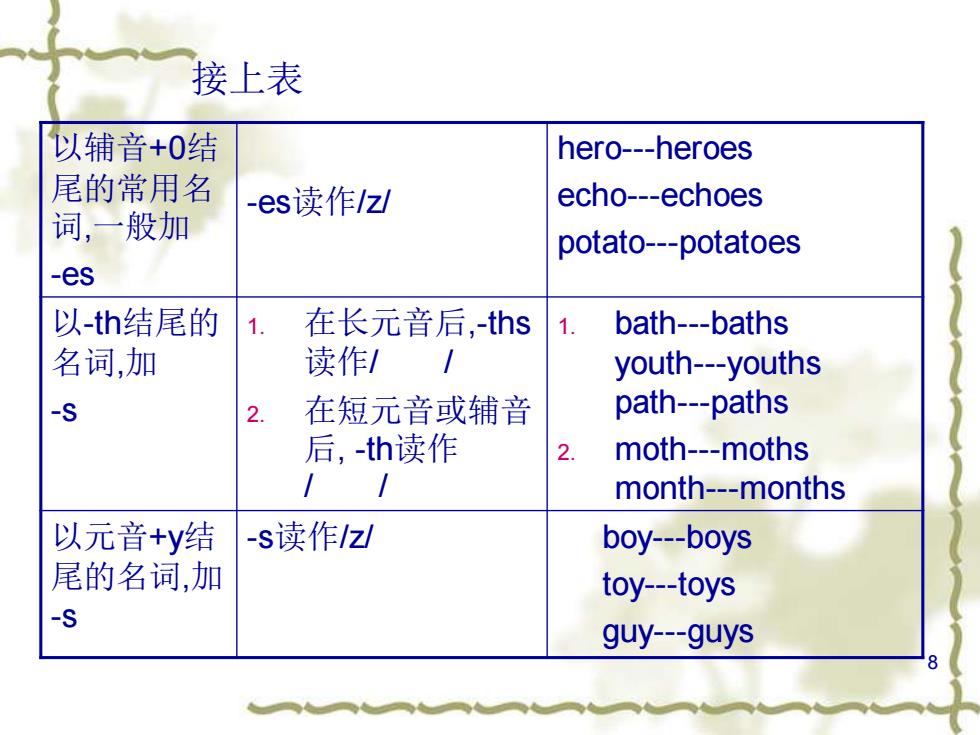
接上表 以辅音+0结 hero---heroes 尾的常用名 -es读作/z山 echo---echoes 词,一般加 potato---potatoes -es 以-h结尾的 1. 在长元音后,-ths 1. bath---baths 名词,加 读作/ youth---youths -S 2. 在短元音或辅音 path---paths 后,-h读作 2. moth---moths month---months 以元音+y结 -s读作/z boy---boys 尾的名词,加 toy---toys -S guy---guys
8 接上表 以辅音+0结 尾的常用名 词,一般加 -es -es读作/z/ hero---heroes echo---echoes potato---potatoes 以-th结尾的 名词,加 -s 1. 在长元音后,-ths 读作/ / 2. 在短元音或辅音 后, -th读作 / / 1. bath---baths youth---youths path---paths 2. moth---moths month---months 以元音+y结 尾的名词,加 -s -s读作/z/ boy---boys toy---toys guy---guys

。除上述情况外,还有一些例外的现象,如以或 fe结尾的词,多数变f为v再加-es: leaf leaves life lives shelf shelves wife wives thief thieves half halves knife-knives wolf wolves loaf-loaves self-selves 9
9 ❖ 除上述情况外,还有一些例外的现象,如以 f 或 fe 结尾的词,多数变 f 为 v 再加 –es: leaf - leaves shelf – shelves thief – thieves knife – knives loaf - loaves life – lives wife - wives half - halves wolf - wolves self – selves
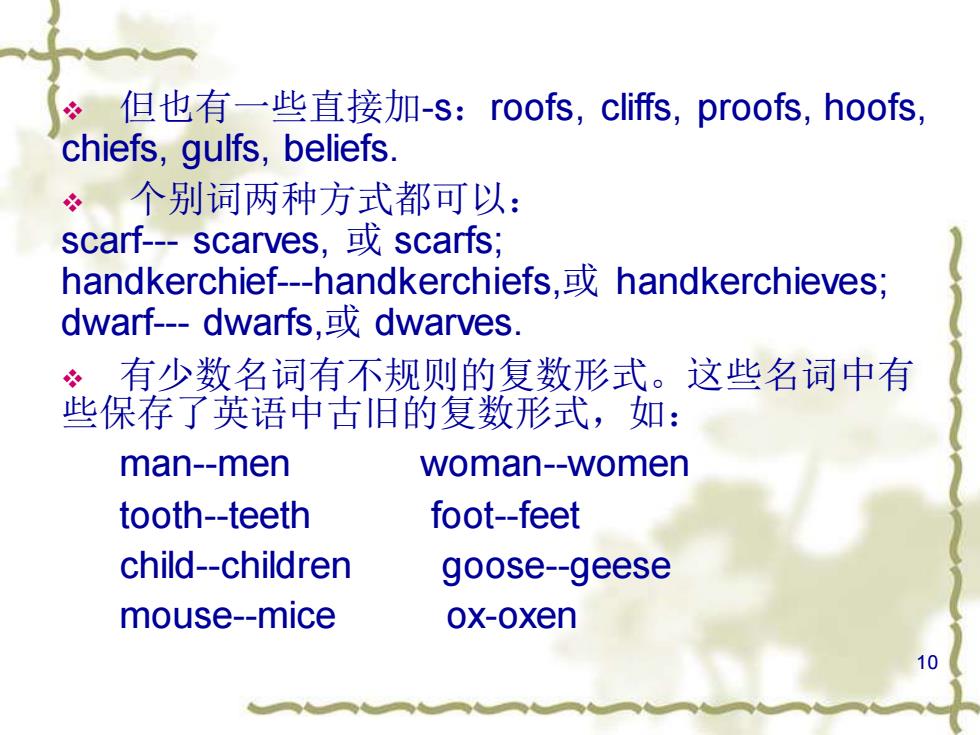
但也有一些直接加-s:roofs,cliffs,proofs,hoofs, chiefs,gulfs,beliefs 。个别词两种方式都可以: scarf---scarves,scarfs; handkerchief---handkerchiefs,handkerchieves; dwarf---dwarfs,dwarves. 有少数名词有不规则的复数形式。这些名词中有 些保存了英语中古旧的复数形式,如: man--men woman--women tooth--teeth foot--feet child--children goose--geese mouse--mice ox-oxen 10
10 ❖ 但也有一些直接加-s:roofs, cliffs, proofs, hoofs, chiefs, gulfs, beliefs. ❖ 个别词两种方式都可以: scarf--- scarves, 或 scarfs; handkerchief---handkerchiefs,或 handkerchieves; dwarf--- dwarfs,或 dwarves. ❖ 有少数名词有不规则的复数形式。这些名词中有 些保存了英语中古旧的复数形式,如: man--men woman--women tooth--teeth foot--feet child--children goose--geese mouse--mice ox-oxen